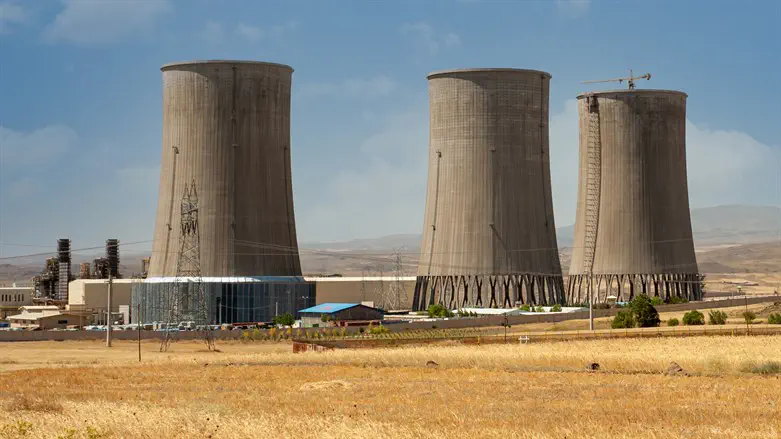
The upcoming U.S.-Iran nuclear talks in Oman will be crucial in determining whether a diplomatic resolution is achievable.
Tensions have notably escalated as President Trump issued a stark warning that Iran must dismantle its nuclear program voluntarily or face “destruction.” This language signals a shift from negotiation to deterrence, raising fears of military escalation if diplomacy fails, especially since satellite images have just revealed a secret Iranian nuclear site,
There are several other developments leading to believe the upcoming talks in Oman are not happening in a calm, cooperative atmosphere—they're unfolding under the shadow of potential confrontation.
-One of these factors is regional proxy clashes
U.S. officials, including Defense Secretary Pete Hegseth, have condemned Iran for backing Houthi rebels in Yemen, especially after their attacks on Red Sea shipping—a direct threat to international trade. The US has accepted the Houthis request to end their war with America.
Then there is Israeli-Iranian Shadow War. Covert strikes and cyberattacks continue between Israel and Iran, especially in Syria and on Iranian infrastructure, further inflaming the situation.
Military Posturing is a factor fueling the pressure during the upcoming talks.
Recently the U.S. has bolstered its naval presence in the Persian Gulf and Red Sea, likely as a signal to Tehran and Iran has reportedly tested or showcased new missile systems, reinforcing its defiance amid pressure.
Iran’s internal politics have shifted toward hardliners, who are more resistant to U.S. pressure and wary of Western intentions. This could make compromise less likely—even if sanctions relief is on the table.
Then there are Russia and China backing Iran diplomatically and pushing back against U.S. sanctions, complicating the negotiations and reducing Washington’s leverage.
The outcome of the U.S.-Iran nuclear talks has significant implications for Israel, both strategically and politically. Israel sees a nuclear-capable Iran as an existential threat. Even the potential for Iran to get closer to weaponization is deeply alarming for Israeli leadership. If talks fail or sanctions ease without strict nuclear limitations, Israel may accelerate contingency plans, including possible military strikes on Iranian nuclear facilities.
A weaker deal—or no deal—could embolden Iran’s support for Hezbollah, Hamas, and other proxies. This fuels Israel’s fear of a multi-front conflict.
If the U.S. agrees to a deal perceived as too soft, Israel may publicly oppose it, as it did with the JCPOA in 2015. This could strain U.S.-Israel ties, especially under Trump’s administration, depending on how closely his team coordinates with Israel. Israeli leaders may use the talks’ outcome to justify policy shifts, increase defense budgets, or lobby U.S. Congress for stronger anti-Iran legislation.
Israel has already been increasing preparations for potential unilateral action. A breakdown in talks could hasten direct military or covert cyber operations against Iran.
While negotiations are proceeding, the path to a conclusion remains uncertain. The involvement of Russia adds complexity to the discussions, balancing its role as a mediator with its own strategic interests.
Given President Trump’s warning, the U.S. is expected to draw a hard line on Iran’s enrichment levels and missile program. There might be behind-the-scenes discussions about consequences if Iran refuses to comply.
The most likely outcome of the fourth round of U.S.-Iran nuclear talks, scheduled for May 11 in Oman is a limited confidence-building agreement, which could modestly de-escalate tensions without resolving core issues. Continued dialogue without results or a breakdown in talks are also possible, with the latter posing high risks of regional instability, especially for Israel, which views Iran’s nuclear program as an existential threat and may consider unilateral military action.
While a comprehensive deal remains unlikely, military escalation—though least probable—would have catastrophic regional consequences. The U.S. should support quiet diplomacy, coordinate closely with Israel to prevent premature military action, engage global partners to sustain unified pressure on Iran, and prepare contingency plans for potential escalation or economic fallout.
Negar Karamati, a Baháʼí Iranian-American journalist and legal advocate, brings a vital voice to the conversation. Based in Los Angeles, she has been active in journalism since 2009, serving as a news editor, reporter, anchor, and translator across Persian-language and international media outlets. Karamati works in close coordination with opposition movements seeking a democratic future for Iran.With a professional certificate in paralegal studies, she integrates legal knowledge into her coverage, analyzing how discriminatory laws fuel human rights abuses.
“My mission is to document truth, challenge injustice, and give voice to those living under tyranny—especially women and minorities. As someone shaped by both the pain of repression and the freedom of exile, I see it as my duty to speak out.”